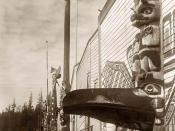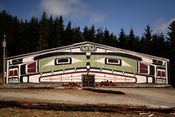As time goes by, gaps between the generations of the world are continually being made. The gap becomes more obvious everyday. In today's world, it's a challenging task to find a child that shares the same interests as their parents. Their taste in music, fashion choices, religious beliefs, or views on political issues are usually quite different. The same goes for the tribal elders and the young in Margaret Craven's novel, I Heard The Owl Call My Name. Although the tribe didn't have the same situations as people today, the concept of their generation differences show a parallel to ours. As time went by in the book, the differences between the elders and the young of the tribe increased in many ways.
The increasing differences between the elders and the young in the novel are demonstrated in many ways. One of the ways being the young of the tribe using English as their primary language.
The old language of the tribe, Kwakwala, is only spoken by the elders of the tribe. The young tribe members go to the church residential school in Alert Bay, and each time they come back they have been more influenced by the white world and the English language. Mark talks to Peter, an elder, about the unease of the village when the young returned. "They speak English all the time, and forget the words of Kwakwala" (61-62). With the many members of the tribe not understanding the Kwakwala language, at traditional events translations are now needed. An example would be the Grouse Dance at the potlatch the old man held for himself. "When the elder introduced it, Jim translated his words:" (69). The English language also had another major effect on the village, dealing with the people. The first indian Mark Brian meets...


